Divine Mercy for Devout and Faithful Souls

On the days following Easter, the Church prays the novena of the Divine Mercy, celebrating our total reliance on our Savior. We have prayed on the first and second days for the souls of sinners and the souls of priests and religious; today we give thanks for the lives of the devout and the faithful, and we ask God to protect them.
My husband and I have a favorite priest, Fr. Roger Landry, who perhaps exemplifies dynamic holiness better than anyone we have ever known. Fr. Roger recently passed on the news that a miracle experienced by one of his parishioners, and attributed to the intercession of John Paul the Great, was being showcased on an episode of 20/20. Of course we watched the program, which also highlighted miracles attributed to St. Damian of Molokai and Fr. Emil Kapuan. We were amazed at the respect with which these stories were reported, and we were amazed by the honest, beautiful and strong faith of those who shared their stories. Like the heroes who had prcedeed and interceded for them, the devout and faithful souls who had been granted the grace of healing simply responded to the needs of their present circumstances in immediate ways which honored their Savior.
For some reason, their stories reminded me of St. Augustine's mandate that holiness is acheived closest to home, in the cares and concerns that are nearest to us, since it is those which are God's gifts to make our souls devout and faithful.
"All persons are to be loved equally. But since you cannot do good to all, you are to pay special regard to those who, by the accidents of time, or place, or circumstance, are brought into closer connection with you. For, suppose that you had a great deal of some commodity, and felt bound to give it away to somebody who had none, and that it could not be given to more than one person; if two persons presented themselves, neither of whom had either from need or relationship a greater claim upon you than the other, you could do nothing fairer than choose by lot to which you would give what could not be given to both. Just so among humanity: since you cannot consult for the good of them all, you must take the matter as decided for you by a sort of providential lot, according as each one happens, for the time being, to be more closely connected with you."
- St. Augustine, De Doctrina Christiana I.28.
My husband and I have a favorite priest, Fr. Roger Landry, who perhaps exemplifies dynamic holiness better than anyone we have ever known. Fr. Roger recently passed on the news that a miracle experienced by one of his parishioners, and attributed to the intercession of John Paul the Great, was being showcased on an episode of 20/20. Of course we watched the program, which also highlighted miracles attributed to St. Damian of Molokai and Fr. Emil Kapuan. We were amazed at the respect with which these stories were reported, and we were amazed by the honest, beautiful and strong faith of those who shared their stories. Like the heroes who had prcedeed and interceded for them, the devout and faithful souls who had been granted the grace of healing simply responded to the needs of their present circumstances in immediate ways which honored their Savior.
For some reason, their stories reminded me of St. Augustine's mandate that holiness is acheived closest to home, in the cares and concerns that are nearest to us, since it is those which are God's gifts to make our souls devout and faithful.
"All persons are to be loved equally. But since you cannot do good to all, you are to pay special regard to those who, by the accidents of time, or place, or circumstance, are brought into closer connection with you. For, suppose that you had a great deal of some commodity, and felt bound to give it away to somebody who had none, and that it could not be given to more than one person; if two persons presented themselves, neither of whom had either from need or relationship a greater claim upon you than the other, you could do nothing fairer than choose by lot to which you would give what could not be given to both. Just so among humanity: since you cannot consult for the good of them all, you must take the matter as decided for you by a sort of providential lot, according as each one happens, for the time being, to be more closely connected with you."
- St. Augustine, De Doctrina Christiana I.28.


<< Home